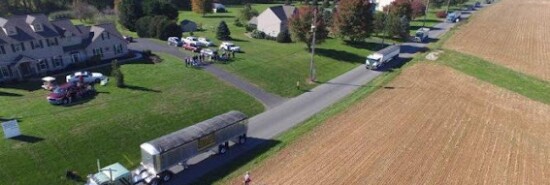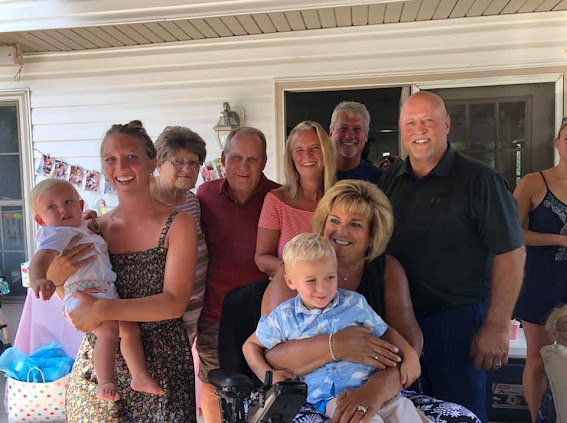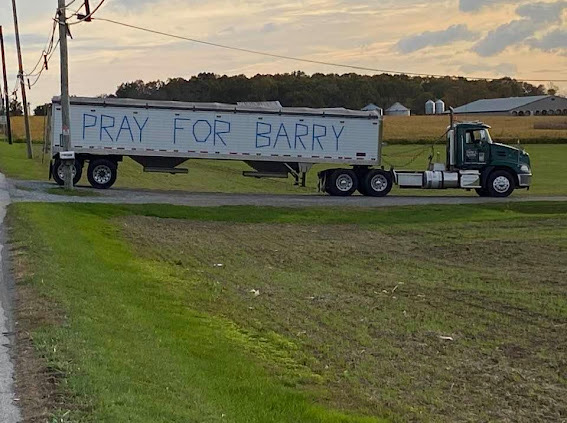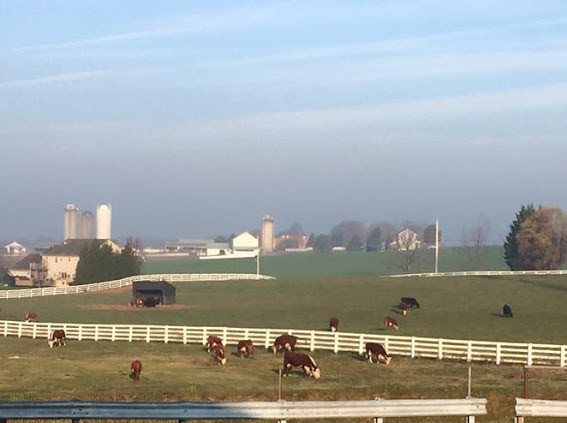
‘Salt of the earth’ — the stories that make America
Salena Zito
Video Embed
OXFORD, Pennsylvania — Despite the wealth of information at our fingertips in the information age, there is a glaring emptiness that plagues us in our storytelling.
We remove nuance and replace it with sensationalism. We shun original stories because they stray too far from the pack. In the process, we miss the beauty, pain, and magic, the simplicity and grace of simple, real-life stories about the ordinary lives of people who work the soil to make America possible. The result is that we lose touch with who we are as a nation.
Bill Hostetter was sitting in the banquet hall of the massive Spooky Nook sports facility in Manheim, Pennsylvania. He was surrounded by hundreds of other farmers, as well as agriculture scientists who do research and development work for the nation’s food supply. They all traveled from across Pennsylvania to attend the annual PennAg banquet, which honors outstanding leaders in the agricultural community.

Seated to Hostetter’s left was Russell Redding, Pennsylvania’s secretary of agriculture. The lights dimmed as the program began with a video recalling the Hostetter family’s impact in this country; despite most of the audience having experienced the same things, his story of sacrifice, hard work, loss, and success brought much of the packed room to tears. That included Hostetter, who had never seen the video before.
Hostetter, along with a team of research scientists from the Pennsylvania Animal Diagnostic Laboratory System, was here to accept Distinguished Service Awards for their contribution to America’s food supply. PADLS scientists keep track of zoonotic diseases, working hand in hand with farmers to ensure their farms can continue providing a reliable food supply.
Without both the grit of the farmer and the training of these hardworking scientists, we would not have that food on all of our tables every day. Yet their respective contributions are unevenly understood.
Without the hard work of the scientists at the PADLS lab, who work around the clock tracking the avian flu, its ravages could have been significantly worse than the 4 million birds lost locally last year. Hostetter’s impact on our lives is less visible, less understood especially by reporters, who are often drawn more to science than to farming. Science is something they were taught in school; farming was not. Science brings new gadgets to their lives and makes things easier. Farming, without which they could not live at all, is too far removed from where they live and what they do.
Hostetter explained that his father, Wilmer, and his mother, Joyce, started their family’s grain business in 1977, when Wilmer built a grain elevator to support the grain business he had started 10 years prior.
Before that, his parents had a well-respected dairy farm, known not just across the country but also internationally for breeding quality dairy cows.

Bill said that he, along with his brothers Barry, Bernie, and John, were all involved with the business right from the start as kids. “I learned it literally from the ground up, working long days at the pit, unloading corn trucks and sweeping out the grain bins,” he said.
To this day, he said, he does not ask anyone working around the grain elevator to do anything he hasn’t done.
Hostetter Grain started here in Oxford with a 95,000-bushel storage bin in the spring for the wheat harvest, followed by a 95,000-bushel bin for the corn harvest.
Today, it owns three elevators outright and holds lease agreements with six other elevators with a total capacity of more than 8 million bushels.
“I remember my father and I standing out in the parking lot taking a look at that first bin and saying, ‘That’s a big bin,'” he said. “We were really concerned about filling it. Now, with all the elevators we have and the relationships we have, we fill that 95,000-bushel bin by 9:30 Monday morning.”
Hostetter said that his is a world of trust and relationships. “If you think about what we do, we write grain contracts that could value well over a million dollars, all done with a simple conversation over the phone, followed up by a one-page contract, either by mail or email,” he said. “And it works.”
If it were any other industry, it would be a much more complex transaction, with multiple layers of lawyers, pages of contracts, and hundreds of emails. In the faster, often sterile world outside of agriculture, where relationships are not cultivated, texting is preferred. Handshakes are improbable. It is good to be reminded, then, that there are still places in this world not so detached from the people and things in which they deal.
Hostetter, 64, said that no matter who he is working with in the industry — the producer or the end user — it is a great industry to be part of. “We work with salt-of-the-earth people,” he said, “honest people, trustworthy people.”
For those who would look at this assessment as naive, Hostetter is not that. There is something to be said about anyone who has spent an entire career dealing with transactions this way, and has not only grown the business, but has been arguably very successful. In fact, he now looks forward to his nephews — Jared, Eric, and Jason — taking over from him.
“I guess the greatest accomplishment was not only growing the business but now having it ready for the next generation to lead it forward — the third one in my family to take my parents’ risk into the future,” he said.
Hostetter’s life has not been without loss. Three years ago, his then 60-year-old brother Barry was battling late-stage pancreatic cancer. Like Bill, Barry was in the family business, and like Bill, his list of civic involvement in the community was long. He served on the Chester Co. Holstein Club, the Chester-Delaware County Farm Bureau Board, the Oxford Zoning Hearing Board, and the board of directors for the Lighthouse Youth Ministry in Oxford for over 30 years.

Because of Barry’s dedication, the community wanted to let him know what he had meant to them. His health took a sudden turn for the worse, and within days, local farmers volunteered to coordinate the local township, fire company, county sheriff’s department, state police, and PennDOT to close down the road leading to the Hostetters’ house. They put a call out to local farmers who worked with the family and hoped that a few trucks would show up for the prayer parade they wanted to offer for Barry.
Instead of a few trucks, several hundred grain trucks, tractors, and farm vehicles from several different states and surrounding counties came out to offer prayer for the Hostetter family. Many of them taped homemade signs of hope, love, and appreciation to the sides of their vehicles as they lined the road for miles and for hours for Barry.
“The sight of those trucks that just went on and on, and the effort it took to make that happen, with many of them traveling over the back roads to get here, was humbling,” Hostetter said, his voice cracking as tears welled up. “You never really know the impact you have on others. You just try to do your best every day.”
“Barry, well, he sat in his pickup on the farm, waving at everyone,” Bill said. “Barry passed not long after that, but he was able to see the impact he had had on other peoples lives, and he really, really enjoyed that day.”
Hostetter explained that his wife Melissa was also injured in a car accident in 1999. This left her with a spinal cord injury and wheelchair-bound at a young age.
“I admire overcomers, and her zest for life is powerful,” he said.
Hostetter lost his father Wilmer in February.
“He and my mother are the biggest influences on life,” he said. “It was such a great loss. Still ask myself every day, ‘Well, what would my father do in this situation?’”
Then, he smiled. “Why would anyone want to know my family’s story?” he asked. “There are thousands, millions of families like mine across this country.”
A partial answer may lie within a speech given 45 years ago by Paul Harvey at that year’s FFA Convention, when he described the hard work, sacrifice, and sense of community farmers and ranchers have passed down for generations in this nation.
The people who form the backbone of our country, often working from sun-up to sundown, caring for the land and their livestock, placing food on all of our tables, have stories of their own. We need to tell more of those stories.
